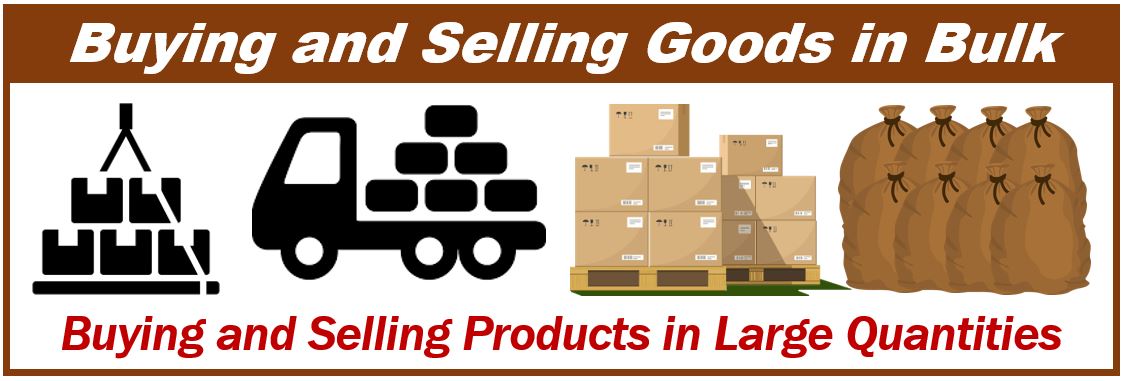What is Bulk? Definition and examples
The word Bulk has several different meanings. However, in nearly all cases, the term is associated with larger-than-usual quantity or size. The strategic advantages of bulk procurement are not limited to cost savings but also include improved efficiency in supply chain management and storage.
The verb to bulk up means to become bigger, bulkier. If you spend one year doing weight lifting and follow a high-protein diet, you will bulk up, i.e., your body will swell in size (become more muscular).

Large mass or size
If I say: “He raised his large bulk out of the armchair,” it means that he is a very large and heavy man. If a package is bulky, it means that it is large, and perhaps difficult to carry or handle.
Most – brunt
If I say: “The bulk of his article consists of lies,” it means that most of the text contains lies.
The Cambridge Dictionary has the following definitions of the term:
“1. Something or someone that is very large. 2. Large size or mass. 3. Most of something. 4. In large amounts (business context).”
This article focuses on the meaning of the word when we use it in a business or economics context.
Bulk purchasing and selling
In the context of purchasing, the term refers to buying something in large quantities. In such cases, the purchaser manages to acquire whatever it is for a lower than normal unit price, i.e., at a discount. If a customer buys something in bulk, the supplier logically sells it in the same way.
Wikipedia.org says the following:
“Bulk purchasing is the purchase of much larger quantities than the usual, for a unit price that is lower than the usual.”
-
Wholesalers and retailers
Wholesalers sell their goods in large quanitities at a discounted unit price to retailers (stores/shops). The larger the retailer’s order is, the lower the unit price will typically be. Wholesalers are businesses that buy from producers in large amounts and sell to retailers or other businesses, also in large amounts. Wholesalers are involved in both bulk purchasing and selling.
-
Many businesses buy in bulk
Apart from stores, other businesses also buy in large quantities, such as restaurants, schools, universities, military barracks, large offices, and hospitals. When a large hospital purchases, for example eggs, it buys hundreds of them in one go rather than just one dozen.
When the purchaser gets wholesale prices because it is a large order, we can say they bought it wholesale, i.e., the single word wholesale on its own can mean the same as in bulk.
-
Individual consumers
Ever since deep freezers became common household appliances a few decades ago, many individual consumers have been bulk purchasing. If you shop in a big-box store such as Costco, you have to purchase each product in larger numbers than you would in a normal supermarket.
Such buying habits not only offer savings but also reflect a shift towards more strategic, long-term provisioning within households.
These are large purchases, but in a much smaller scale than in B2B interactions. B2B stands for business-to-business, which contrasts with B2C, which stands for business-to-consumer.
Bulk cargo
If a freight ship, truck, airplane, or train is transporting a very large quantity of an unpackaged commodity, such as wheat, oil, coal, or gravel, we refer to is as bulk cargo.
The material of this type of cargo may be in particulate, granular, or liquid form. Shippers, producers, and commodity wholesalers regularly check the costs of transporting bulk commodities at the Baltic Exchange in London. The Baltic Exchange indices are also used to settle FFAs (freight futures).

Etymology of bulk
A word’s origin is its etymology. Studying how a word’s meaning evolved over time is also part of etymology.
According to etymonline.com, the term Bulk first emerged in the English language in the middle of the fourteenth century with the meaning “ship’s cargo.” One hundred years later, the term also meant “a heap, the volume of something.”
The word originated from the Old Norse word Bulki, which meant “ship’s cargo, a heap.”
The verb to Bulk Up appeared in the middle of the fifteenth century with the meaning “swell, become more massive.”
Derivatives of “Bulk”
From the root word “bulk,” we get many derivatives. Let’s have a look at some of them, learn their meanings, and see how we can use them in a sentence:
-
Bulk (Noun)
The mass or magnitude of something large.
Example: “The bulk of the statue made it difficult to transport.”
-
Bulky (Adjective)
Of large size for its weight.
Example: “He struggled to fit the bulky package through the door.”
-
Bulkiness (Noun)
The state or quality of being bulky.
Example: “The bulkiness of the woolen coat made it quite warm.”
-
Bulkhead (Noun)
A dividing wall or barrier between compartments on a ship, aircraft, or other vehicle.
Example: “We stored the life jackets in the compartment behind the bulkhead.”
-
Bulk (Verb)
To increase in size or volume; to make or become bulkier.
Example: “He bulked up considerably after several months of training.”
-
Bulking (Verb, Present Participle)
The process of becoming larger or more substantial.
Example: “The company is bulking its presence in the market with aggressive advertising.”
-
Bulked (Verb, Past Tense)
Became larger in quantity or volume.
Example: “The clouds bulked larger as the storm approached.”
-
Unbulky (Adjective)
Not bulky; compact or streamlined.
Example: “She preferred unbulky luggage for her frequent travels.”
-
Bulk-buy (Verb)
To purchase goods in large quantities.
Example: “They decided to bulk-buy to take advantage of the wholesale prices.”
-
Bulk-carrier (Noun)
A ship specifically designed to transport large volumes of goods.
Example: “The bulk-carrier was loaded with grain for international transport.”
-
Bulkiness (Noun)
The characteristic of being large in volume or mass.
Example: “The bulkiness of the sofa made it a challenge to move up the stairs.”
-
Bulk up (Phrasal Verb)
To gain body mass, typically through an increase in muscle mass.
Example: “He’s been hitting the gym to bulk up for the football season.”
There isn’t a commonly used adverb form of “bulk.”
Video – What is Bulk?
This video, from Marketing Business Network, our sister channel on YouTube, explains what ‘Bulk’ is using easy-to-understand language and examples.

